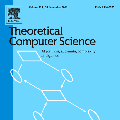We investigate if there is a peer influence or role model effect on successful graduation from Therapeutic Communities (TCs). We analyze anonymized individual-level observational data from 3 TCs that kept records of written exchanges of affirmations and corrections among residents, and their precise entry and exit dates. The affirmations allow us to form peer networks, and the entry and exit dates allow us to define a causal effect of interest. We conceptualize the causal role model effect as measuring the difference in the expected outcome of a resident (ego) who can observe one of their social contacts (e.g., peers who gave affirmations), to be successful in graduating before the ego's exit vs not successfully graduating before the ego's exit. Since peer influence is usually confounded with unobserved homophily in observational data, we model the network with a latent variable model to estimate homophily and include it in the outcome equation. We provide a theoretical guarantee that the bias of our peer influence estimator decreases with sample size. Our results indicate there is an effect of peers' graduation on the graduation of residents. The magnitude of peer influence differs based on gender, race, and the definition of the role model effect. A counterfactual exercise quantifies the potential benefits of intervention of assigning a buddy to "at-risk" individuals directly on the treated resident and indirectly on their peers through network propagation.
翻译:暂无翻译




